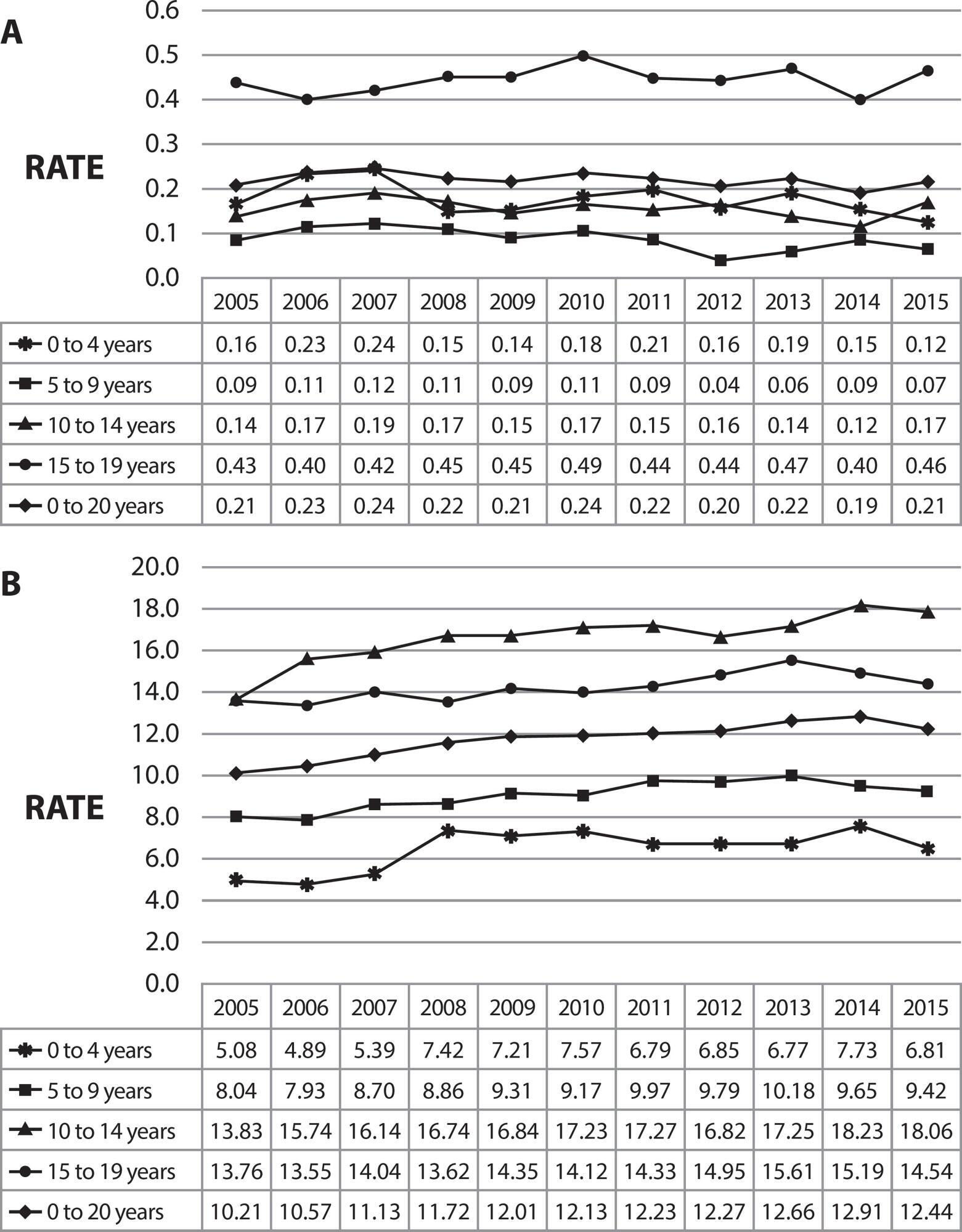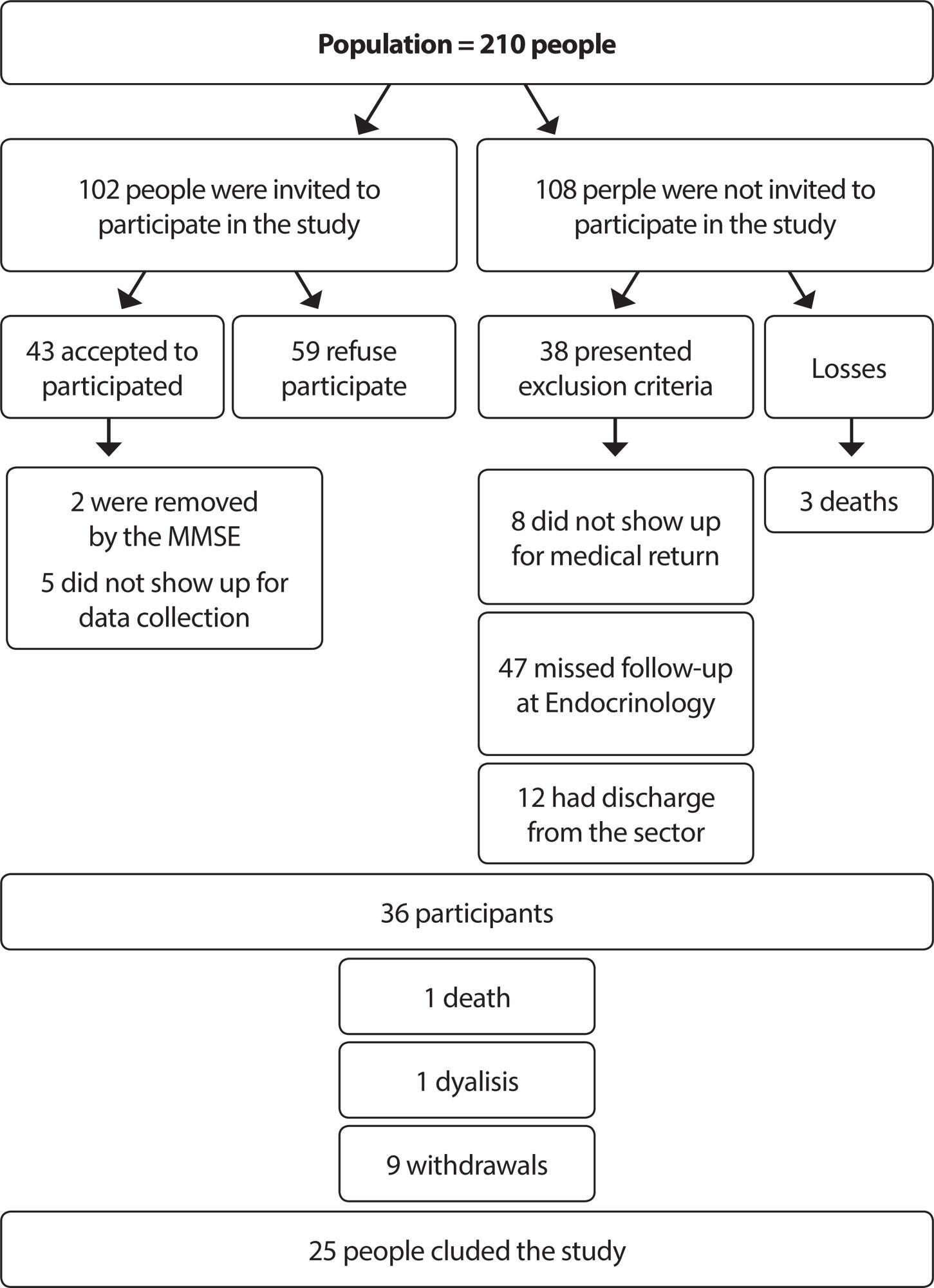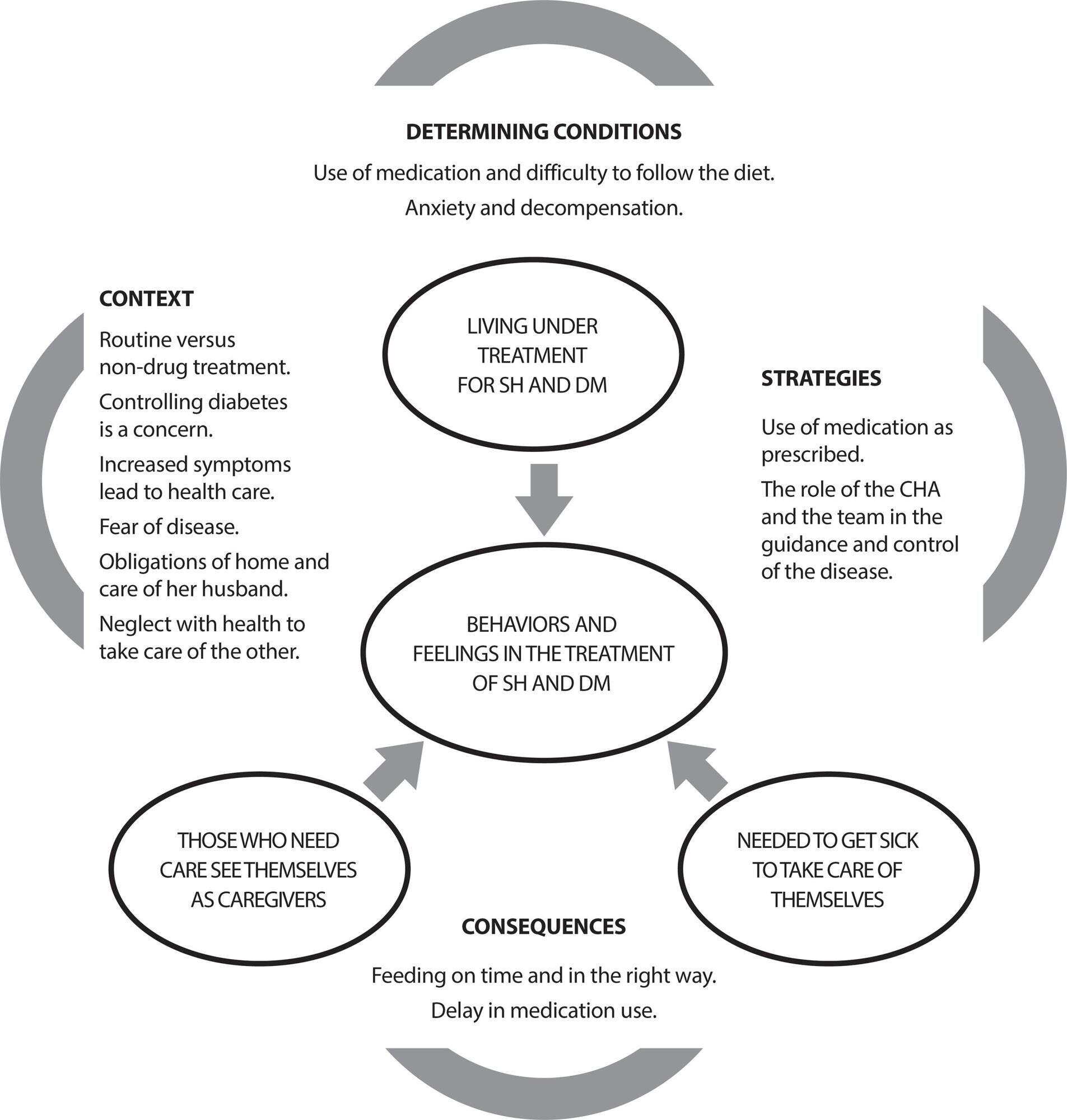-
ORIGINAL ARTICLE
Usability of a mobile application on diabetic foot self-care
Revista Brasileira de Enfermagem. 2020;73(4):e20180862
06-08-2020
Resumo
ORIGINAL ARTICLEUsability of a mobile application on diabetic foot self-care
Revista Brasileira de Enfermagem. 2020;73(4):e20180862
06-08-2020DOI 10.1590/0034-7167-2018-0862
Visualizações0Ver maisABSTRACT
Objectives:
to assess the usability of an app prototype for diabetic foot self-care by an end user.
Methods:
a descriptive study that uses heuristic assessment of a hybrid app usability. Fifteen users of an outpatient diabetes care service in a capital of Northeastern Brazil participated in the study during April 2018. The usability measurement tool called Smartphone Usability questionnaiRE was applied.
Results:
the lowest score was 77 and the highest was 112, with an average usability of 96.1 points. Usability was framed in the last two levels, 70 and 8o. Users now strongly agree (level 70) and fully (level 80) with the assessed items, which represents good usability of the apps prototype.
Conclusions:
the final product developed focuses on user needs and requirements, which can ensure usability based on effectiveness, efficiency and satisfaction triad.
-
ORIGINAL ARTICLE
Prenatal care satisfaction: perception of caregivers with diabetes mellitus
Revista Brasileira de Enfermagem. 2019;72(suppl 3):305-311
12-13-2019
Resumo
ORIGINAL ARTICLEPrenatal care satisfaction: perception of caregivers with diabetes mellitus
Revista Brasileira de Enfermagem. 2019;72(suppl 3):305-311
12-13-2019DOI 10.1590/0034-7167-2018-0978
Visualizações0ABSTRACT
Objective:
to understand the satisfaction of pregnant women with diabetes who took insulin during pregnancy and prenatal care performed through outpatient and inpatient follow-up.
Method:
a qualitative approach with analysis of 30 pregnant women who underwent prenatal care and participated in a clinical trial study carried out by the research group of the Perinatal Diabetes Research Center of the Hospital das Clínicas, of the Faculdade de Medicina de Botucatu. The data were collected through interviews and analyzed from content analysis.
Results:
from the category Satisfaction, the following subcategories emerged: facilities and difficulties faced in prenatal care performed through outpatient or inpatient follow-up, demonstrating that the pregnant women were satisfied with the prenatal care offered regardless of the type of follow-up.
Conclusion:
there was satisfaction in both care, but in outpatient care some structural, technical and administrative difficulties were identified, requiring reassessment, in order to guarantee service agility.
Palavras-chave: Diabetes MellitusDiabetes, GestationalPatient SatisfactionPregnant WomenPrenatal CareVer mais -
ORIGINAL ARTICLE
Hospitalization and mortality by diabetes mellitus in children: analysis of temporal series
Revista Brasileira de Enfermagem. 2019;72(suppl 3):147-153
12-13-2019
Resumo
ORIGINAL ARTICLEHospitalization and mortality by diabetes mellitus in children: analysis of temporal series
Revista Brasileira de Enfermagem. 2019;72(suppl 3):147-153
12-13-2019DOI 10.1590/0034-7167-2018-0299
Visualizações0Ver maisABSTRACT
Objective:
to analyze the trend of hospitalization rates and mortality due to Diabetes Mellitus in children and adolescents in Brazil.
Method:
temporal series study, hospitalization rates and diabetes mortality in children and adolescents. Data were obtained from the Hospital Information System and Mortality Information System, from 2005-2015, with analysis performed by polynomial regression modeling.
Results:
87,100 hospitalizations and 1,120 deaths from diabetes were analyzed. Hospitalizations rates increased for both genders and all age groups, with an increase for adolescents aged 10-14 years. The mortality rate declined, except for the 15-19-year age group. In the overall mortality trend in Brazil, the South and Southeast showed a decrease, whereas for hospitalizations only the Center-West remained constant, while the others increased.
Conclusion:
however, there was a decrease in infant mortality and increase in hospitalizations.

-
ORIGINAL ARTICLE
Self-care activities, sociodemographic variables, treatment and depressive symptoms among older adults with Diabetes Mellitus
Revista Brasileira de Enfermagem. 2019;72(suppl 2):22-29
12-05-2019
Resumo
ORIGINAL ARTICLESelf-care activities, sociodemographic variables, treatment and depressive symptoms among older adults with Diabetes Mellitus
Revista Brasileira de Enfermagem. 2019;72(suppl 2):22-29
12-05-2019DOI 10.1590/0034-7167-2017-0579
Visualizações0Ver maisABSTRACT
Objective:
to analyze the association between self-care activities of older adults with Type 2 Diabetes Mellitus (DM) and sociodemographic variables, type of treatment and depressive symptoms.
Method:
inferential and cross-sectional study, with 121 older adults with Type 2 DM in ambulatory care. We used a questionnaire for characterization of sociodemographic and health, questionnaire self-care activities with DM, Mini Mental State Examination and Geriatric Depression Scale. The association of variables was used (Fisher’s exact test) and for comparing the means (Student’s t-test and analysis of variance).
Results:
The mean age was 68.1 years, the majority were women (57.2%), retired (71.9%) and married (65.3%). The highest averages were for the activities: “to dry the spaces between the toes, after washing them” and smaller averages for “exercise”.
Conclusion:
In spite of high average for self-care activities, there is a need for enhanced performance and compliance to them.
-
ORIGINAL ARTICLE
Education in Diabetes Mellitus for blood glucose self-monitoring: a quasi-experimental study
Revista Brasileira de Enfermagem. 2019;72(6):1601-1608
10-21-2019
Resumo
ORIGINAL ARTICLEEducation in Diabetes Mellitus for blood glucose self-monitoring: a quasi-experimental study
Revista Brasileira de Enfermagem. 2019;72(6):1601-1608
10-21-2019DOI 10.1590/0034-7167-2018-0731
Visualizações0Ver maisABSTRACT
Objective:
to evaluate the contributions of an educational program for capillary blood glucose self-monitoring.
Method:
a quasi-experimental study performed in an outpatient unit of a tertiary health care service in a sample of 25 people with Type 2 Diabetes Mellitus, from July 2016 to December 2017, developed through interactive tools for care with capillary blood glucose self-monitoring.
Results:
among the items of capillary blood glucose self-monitoring that showed improvement after participation in the educational program, the most noteworthy are the “postprandial blood glucose values” (p=0.0039), “Interpretation of capillary blood glucose results with meals and medications” (p=0.0156), “recognition of the ‘weakness’ symptom for hyperglycemia” (p=0.0386) and “administration of medications correctly” for hyperglycemia prevention (p=0.0063).
Conclusion:
the study made it possible to recognize the main characteristics of blood glucose self-monitoring that may contribute to the care for the person with diabetes.

-
ORIGINAL ARTICLE
Living under treatment for Systemic Hypertension and Diabetes Mellitus: Feelings and behaviors
Revista Brasileira de Enfermagem. 2019;72(1):102-110
01-01-2019
Resumo
ORIGINAL ARTICLELiving under treatment for Systemic Hypertension and Diabetes Mellitus: Feelings and behaviors
Revista Brasileira de Enfermagem. 2019;72(1):102-110
01-01-2019DOI 10.1590/0034-7167-2016-0500
Visualizações0Ver maisABSTRACT
Objective:
To understand the feelings and behaviors of people being treated for Systemic Hypertension (SH) and Diabetes Mellitus (DM).
Method:
A qualitative study based on Grounded Theory and Symbolic Interactionism, with 27 participants in treatment for SH and DM followed up by the Family Health Strategy team. Open, axial and selective coding was performed, giving rise to three theoretical categories and the central category.
Results:
The daily life is explicit in the (lack of)care of the self with the chronic disease and feelings of sadness and anxiety are expressed as reasons for the lack of control of the disease. It points out that people take care of themselves because of fear of complications, reinforced the need for guidance on the use of medication and the empowerment of the chronic patient for self-care and care for the other.
Final considerations:
Knowing behaviors and feelings of people with SH and/or DM allows a professional performance beyond the chronic condition.

-
EXPERIENCE REPORT
Conversation map: an educational strategy in the care of elderly people with diabetes mellitus
Revista Brasileira de Enfermagem. 2018;71(suppl 2):925-929
01-01-2018
Resumo
EXPERIENCE REPORTConversation map: an educational strategy in the care of elderly people with diabetes mellitus
Revista Brasileira de Enfermagem. 2018;71(suppl 2):925-929
01-01-2018DOI 10.1590/0034-7167-2017-0064
Visualizações0ABSTRACT
Objective:
To report the experience of using diabetes conversation maps as an educational strategy for diabetic elderly people.
Method:
Experience report, conducted from July to December 2016 in a specialized outpatient clinic for diabetics, in Fortaleza, Ceará, Brazil. A total of 72 users participated, between diabetics and those accompanying them.
Results:
The participants talked about issues that were not addressed in personal consultations, and could see themselves through the stories of others, thus realizing they were not alone and that others also experienced the same difficulties as them. Through empathy and the accounts of others, participants built knowledge and practices for their own daily lives.
Final Considerations:
The conversation map enables professionals to empower patients with diabetes, promoting self-care and ensuring better control over the disease, in order to prevent or delay the onset of related complications.
Palavras-chave: Diabetes MellitusHealth EducationHealth of the ElderlyNursingPatient Acceptance of Health CareVer mais -
RESEARCH
Nursing care to patients with diabetes based on King’s Theory
Revista Brasileira de Enfermagem. 2018;71(3):1092-1098
01-01-2018
Resumo
RESEARCHNursing care to patients with diabetes based on King’s Theory
Revista Brasileira de Enfermagem. 2018;71(3):1092-1098
01-01-2018DOI 10.1590/0034-7167-2016-0268
Visualizações0Ver maisABSTRACT
Objective:
To verify the effectiveness of nursing interventions based on the Imogene King’s Theory of Goal Attainment, on improving care for people with diabetes and adherence to treatment.
Method:
Quasi-experimental, longitudinal, randomized, simple study in a Primary Health Care Unit, in the city of Fortaleza, Ceará state, Brazil. The sample consisted of 60 people with diabetes, divided into intervention and control groups, whose collection occurred from February to August 2013.
Results:
In the intervention group, a significant adherence of the patients to the goals defined in the study was found. In the control, there was improvement in some aspects of the treatment.
Conclusion:
With these results, it was possible to conclude the feasibility of using Theory of Goal Attainment in the positive aspects for adherence to diabetes treatment and improvement of quality of life.



